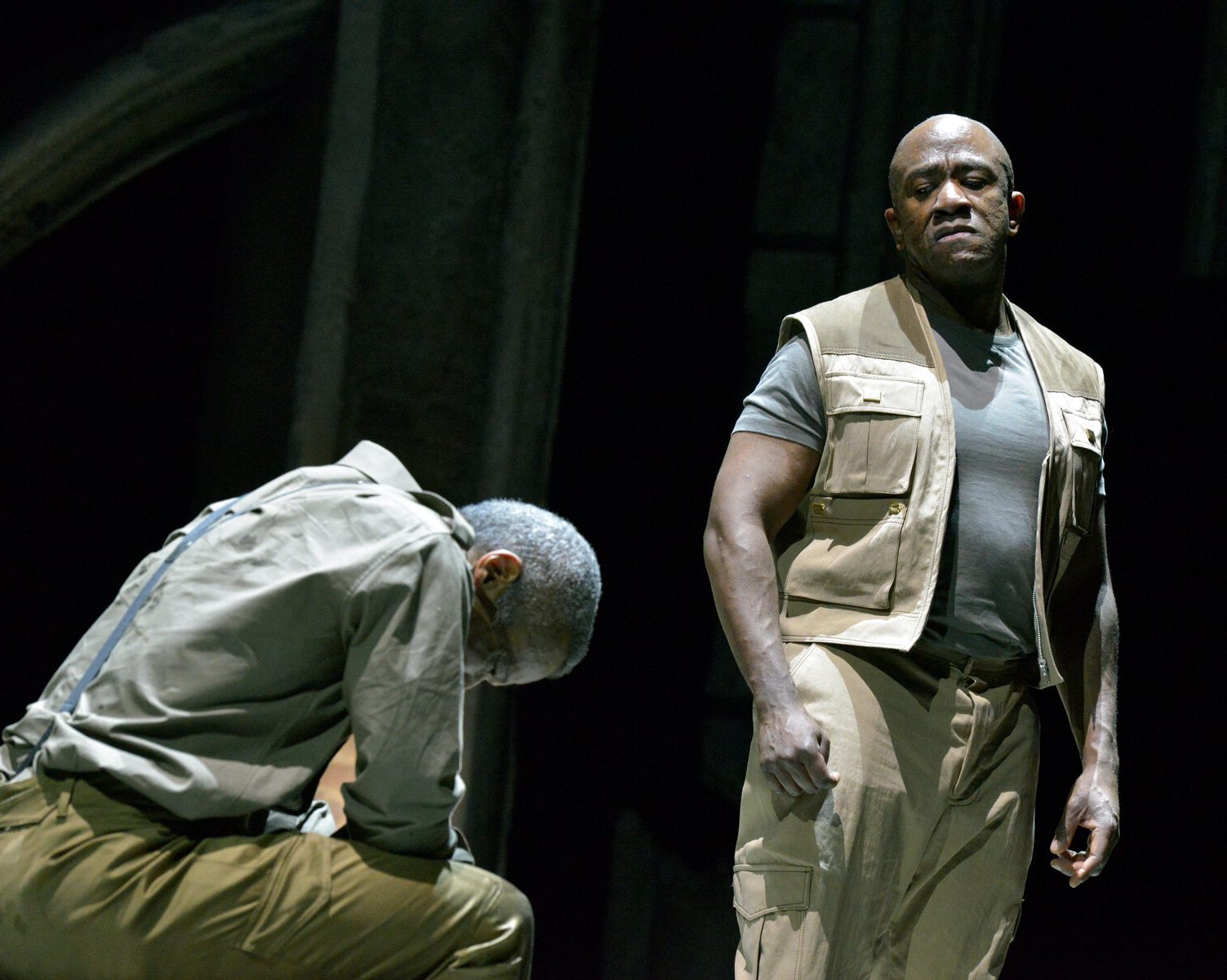In 1968, American psychologist David Ausubel wrote an article in which he stated that the most influential factor for learning new things is “what the learner already knows.” In other words: prior knowledge. According to him, the new things that we want or need to learn need to be connected to what we already know.
Kirschner, Sweller, and Clark (2006) hit the nail squarely and firmly on the head. If your pupils do not have the basic ‘hooks’ or relevant prior knowledge to attach more complex information to, very quickly they will find themselves adrift of the lesson. That – and the extraneous load will be higher of course.
Back in January 2020, I was faced with challenge of teaching Shakespeare’s Othello to a group of Year 8 low prior attaining boys. The class had very little almost no prior knowledge of Shakespeare and even less motivation to study it, even if the text was an inspired choice for them (not mine by the way). For that matter, I did not have a great deal of contextual knowledge either. Fast forward 12 weeks and the boys had become huge fans of the RSC’s and Lucian Msamati’s Iago, if not Shakespeare fans – small acorns right?
This unit of work would prove to be the catalyst for a two year edventure – designing and developing RememberMore – as an catalyst for both encoding new knowledge and a retrieval practice platform for strengthen the retrieval strength and as the unit developed, the storage strength. That is “how deep-rooted/interconnected memories are.” The later, a key design contribution put forward by the pupils.
Where to start?
Without any foundational knowledge – where to start? And I do mean “without any.” A good number of the pupils, some EAL pupils, where unaware of who Shakespeare was. And it would be fair to say, that quite a lot a foundational knowledge is required to understand the more complex stuff of Othello. Knowledge I was busy collating, reading and researching myself – my Wakelet collect is here. A hat tip to Sarah @iles_sarah and Pru @PrudenceScott21, Cantell English co-Heads of Department, who tolerated endless questions.
As before, we made explicit to the pupils the knowledge they required: a unit outline in the front of books and a knowledge organiser in the back. But the heavy lifting was enacted by very low stakes, self marked “daily quizzing” or retrieval practice and weekly knowledge assessments very a spreadsheet of questions.
As the knowledge began to stick and connections started to be form, as the pupils self-confidence developed, as their belief in their own abilities to get to grips with this stuff surfaced, so “we” fell in love with the play. As I said, with Lucian Msamati’s Iago, who the boys proposed was akin to Joaquin Phoenix’s Joker, recently released only a few months previously. Now that a connect born of a complex understanding of the character.
So when one of the pupils said, “He’s not actually afraid of dying. He is much like the Joker. He’s afraid of living.
Paraphrasing a pupils response.
At the time of teaching the text, what I really would have benefited from knowing, was – what did the pupils “confidently know,” and have access to, to help them think. An Ausubelian perspective. Now that would have been helpful. What I really wanted to know was – what knowledge had reached their stomachs.
You can lead a horse to water, but the only water that reaches his stomach is what he drinks.
Ernst Rothkopf
So, when designing RememberMore we always hoped to be able to present that information back to teachers as insights. And now we can. Both one a pupil metric and importantly as an item / card metric. It may have taken almost two years, but I think it is invaluable.
Boundary Oak Year 7s – Hole
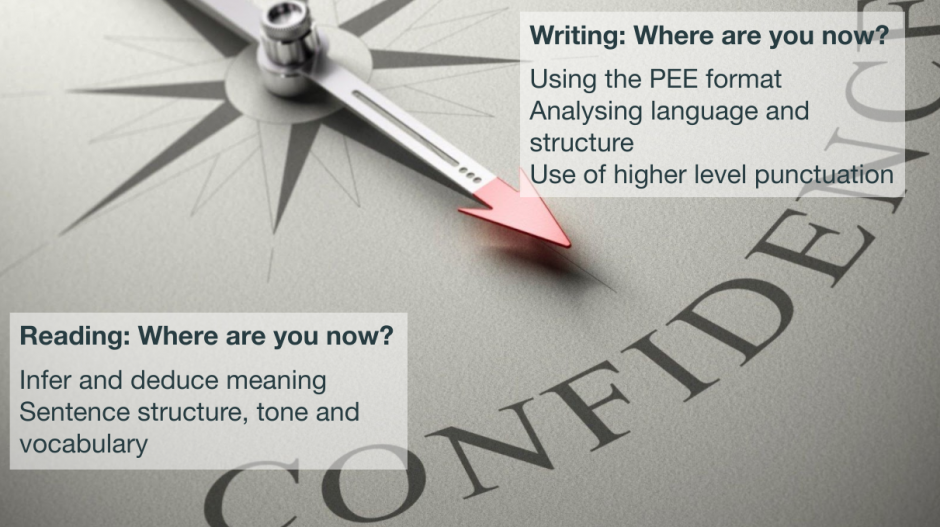
Somewhat ironically, fast forward two years. A new, different school and Year 7 are reading Louis Sachar’s “Holes.”
The unit has two foci. For reading, it is on inferring and deducing meaning. A complex skill that requires foundational knowledge of the Texas now and at the turn of the 19th century.
It is ironic as Holes is a non-linear story line – that and there are a range of structural features and devices, “This ain’t no girl scout camp!”
For writing, the pupils are being introduced to PEE. What are they going to analyse? If not their knowledge of the story line?
Whilst the school, text and ability profile of the pupils is markedly different, the teaching challenge is remarkably familiar. The pupils need foundational knowledge with which to think, to infer and deduce meaning, and latterly to analyse.
As our knowledge becomes deeper and more comprehensive, our capacity for critical thinking, problem solving and creativity within that domain unfolds.
Daniel Willingham, (2007).
Therefore, as a teacher, it remains immensely helpful to know the water reaches their stomach. Who better to tell us, what they “confidently know,” what knowledge they have to think with, than the pupil themselves. Hence, when learning with RememberMore, pupils a constantly reporting concurrent metacognitive judgements of confidence.
Pupils reviewing the Holes deck confidently report their understanding of Ch 01 cards…
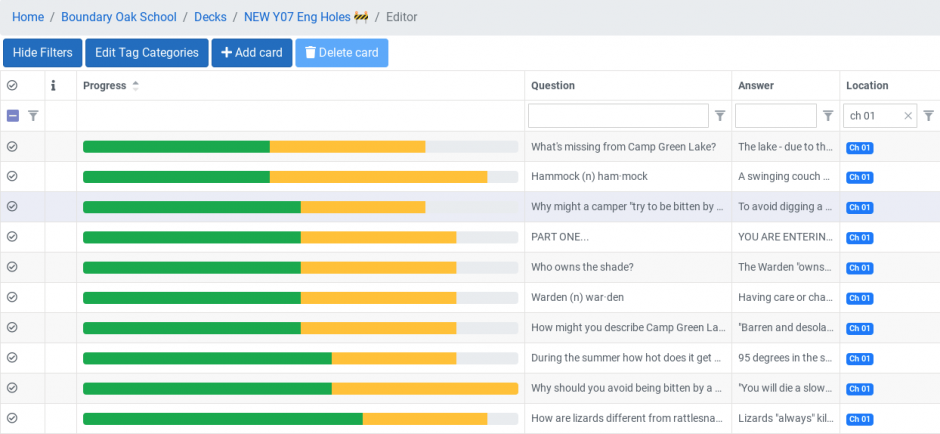
and the development of the plot lines in the early chapters more generally. This corresponds to what I had gleaned as a the class teacher. Cards about the lizards, interestingly, seem to be more memorable than most.
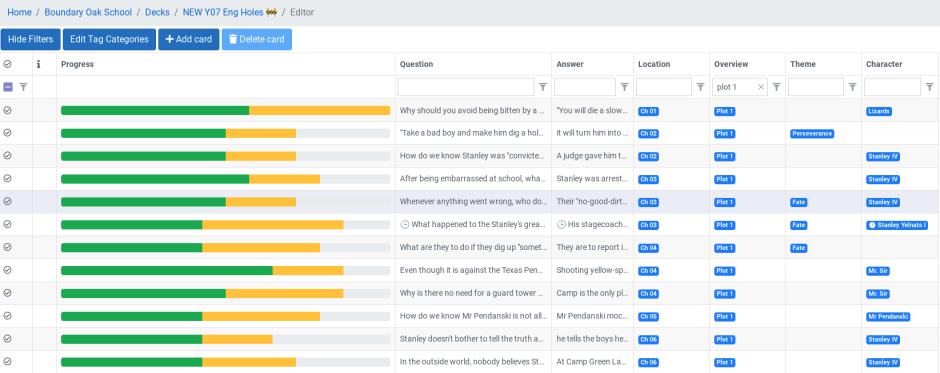
In contrast, the pupils confidence in their understanding of the Warden’s interests and plot line within Chapter 15 areas less secure and it may well be worth revisiting her character, or chapter 15 before proceeding too fast.
Why might that be? Well – that is for the teacher to investigate.

Explicit Vocabulary
We are also interested in broadening their vocabulary. Likewise, when reviewing the Vocab cards from the early chapters – “Forlorn” is not a word the pupils are confident with. Whilst not hugely important however – we can easily revisit why Elya was feeling forlorn, down beat and dejected as he sailed to America.
Furthermore, these insights will help me code or re-code vocabulary in the deck for the next time I am teaching the book.
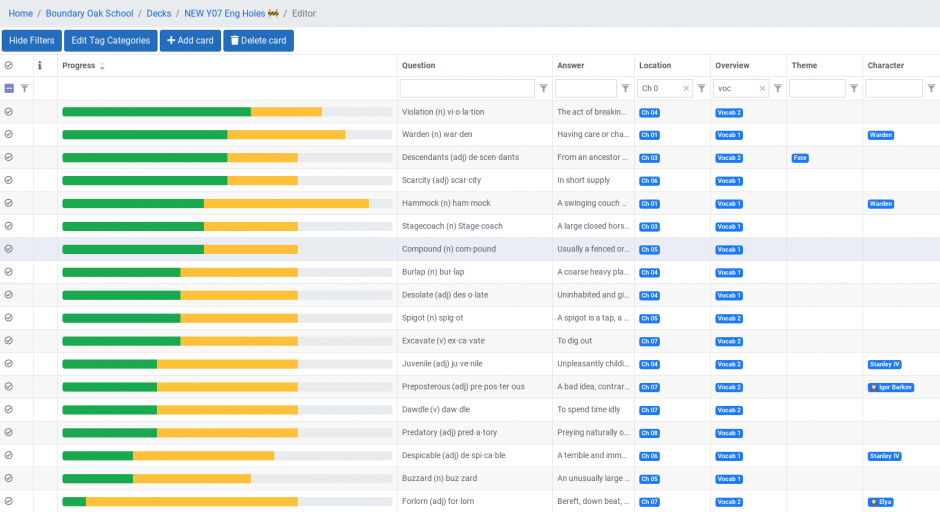
Whilst these insights are valuable as we work with the deck, I can see them being even more valuable when cards are tagged by topic – for example:
I showed them how I could tell chapter 5 was their weakest. Been on working on it since we chatted and today they nailed solubility of nitrates! The one we discussed.
Chemistry teacher
More to follow as I work with this new feature. Without questions, knowing what the pupils confidently know and don’t know can only help identify the knowledge gaps and inform my teaching.
